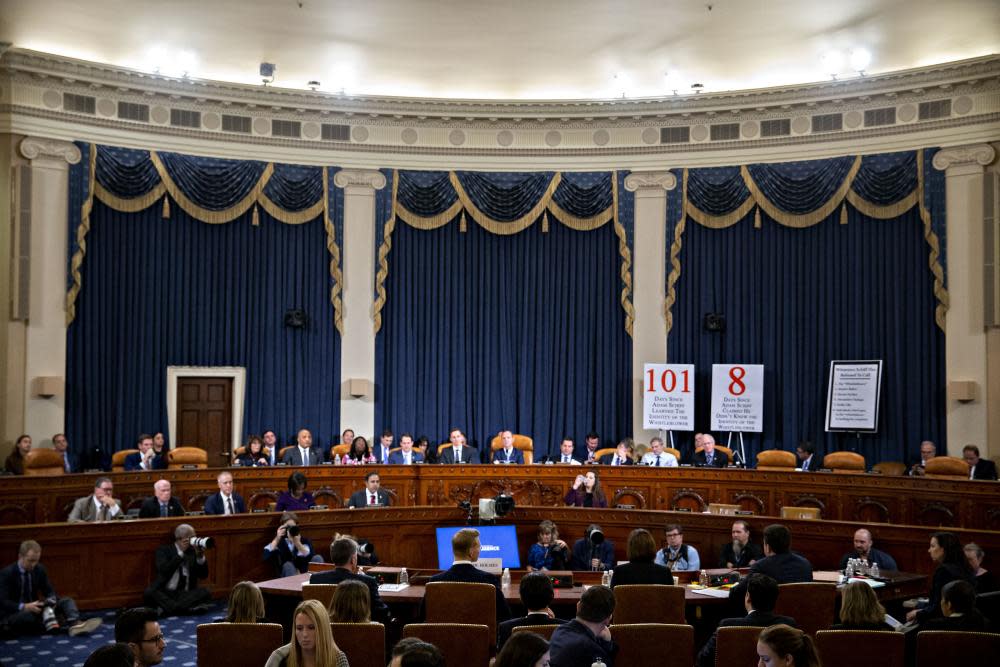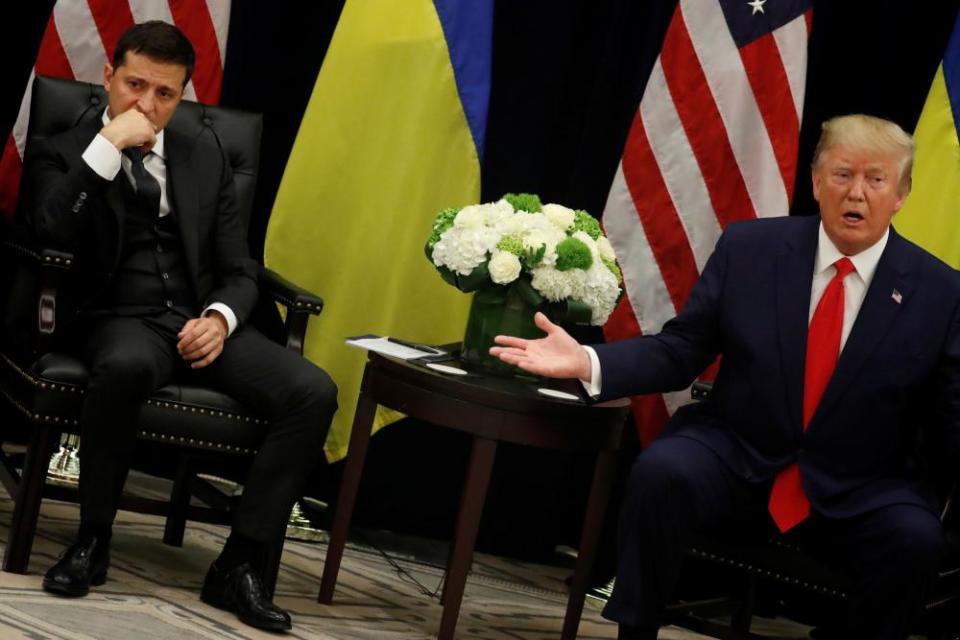Not just the facts: Republicans' top six impeachment falsehoods

The morning after public impeachment hearings came to an apparent close, the biggest names in conservative punditry were happy to call the ballgame.
At the Wall Street Journal, Peggy Noonan declared that the case against Donald Trump had “been so clearly made you wonder what exactly the Senate will be left doing”.
Related: Trump's impeachment shows US officials at their best and his allies at their worst
“On the substance,” wrote Rich Lowry over at the National Review, “Democrats have won.”
But the color of the sky was different on Capitol Hill, where elected Republicans insisted Democrats had produced no evidence of wrongdoing and Trump had been summarily vindicated.
“I’ve just focused on the facts and it is clear as every day that goes by [sic] that Democrats’ case for impeachment is crumbling,” the New York representative Elise Stefanik, who participated in the hearings, told Fox News on Thursday night.
How can inhabitants of the same ideological ecosystem disagree so sharply? It appears that getting into the bunker with Trump, as the politicians have, requires embracing falsehoods too plain or painful for the pundits to bear.
Here is a list of major falsehoods in the air – or in the recycled air of the bunker, at least:
1 Trump is an anti-corruption champion
Republicans argue that Trump asked Ukraine to investigate Joe Biden and the gas company Burisma out of a concern about corruption in Ukraine. But that seems to be the single example, in his presidency and from his life, of Trump wanting to fight corruption.
Related: 'Absolute fearlessness': women take impeachment spotlight and speak truth as Trump fumes
Indeed, from the casino business to New York real estate to national politics, Trump has thrived where corruption thrives. He does not have a problem with corrupt regimes – he openly admires them. He also has a long track record of personal corruption, from running a fraudulent university and charity organization to keeping separate tax records for creditors and the Internal Revenue Service, to installing family members in key government posts, to profiting off the presidency, including through a hotel he has now put on the market. He also tried to steer a contract to host the G7 summit to his own resort. And he is a habitual liar.
2 The witnesses are a cabal
Republicans argue that the witnesses in the impeachment inquiry are “anonymous and unelected bureaucrats” and “Never Trumpers” who were angered to be sidelined under an unconventional president. But the witnesses, whose names were printed on the placards they testified behind, were mostly Trump appointees with long track records in both Republican and Democratic administrations.
It is Trump’s own people who are coming forward, at risk to their careers and under threats to their safety, to say what happened (if, admittedly, not everyone was willing to face those risks). And while certain witnesses, such as the former ambassador Marie Yovanovitch and former national security council adviser Fiona Hill, did find themselves shut out by the Ukraine scheme, two of the witnesses, the diplomats Gordon Sondland and Kurt Volker, were spearheading the scheme, according to testimony, with Sondland eager to take credit and Volker less so.
3 The Ukraine scheme was a foreign policy
Republicans argue that the 25 July phone call with Ukraine’s president, Volodymyr Zelenskiy, and other diplomatic activity at which the witnesses recoiled simply represented a legitimate new direction in foreign policy under Trump. But that exaggerates the motivations and scope of Trump’s narrow interest – investigating Biden and an elections conspiracy theory – in an apparent effort to bring what Trump was doing under the umbrella of his immense presidential powers. Do those powers include the ability to task diplomats to help him win the next election? What’s the difference between that and “l’état, c’est moi”?
Hill drew the distinction plainly, calling the Ukraine scheme “a domestic political errand”, not “national security foreign policy”, and saying: “Those two things had just diverged.”
4 Trump saying ‘no quid pro quo’ is exculpatory
Republicans including the House minority leader, Kevin McCarthy, argue that because Trump said the words “no quid pro quo” on the phone to Sondland, the Ukraine scheme did not exist. But misconduct cannot be undone by saying “there was no misconduct”.
Also relevant: this particular statement from Trump came late in the game, on 7 September, after diplomats and Rudy Giuliani had been working for at least five months to consummate the scheme, after Trump asked Zelenskiy directly for a “favor” – and after it became known that a whistleblower complaint was hanging over the president’s head.
5 No evidence of a Ukraine scheme
Republicans argue that the hearings produced no evidence that Trump ever conditioned a White House meeting or military aid for Ukraine on an announcement of investigations he wanted. But evidence presented in the hearings of such a scheme was substantial, and internally consistent.

The evidence included public statements by Giuliani, acting White House chief of staff Mick Mulvaney and the Wisconsin senator Ron Johnson; text messages and emails provided by Sondland; testimony by Hill: “It became very clear the White House meeting itself was being predicated on other issues, namely investigations and the questions about the election interference in 2016”; testimony by state department aide David Holmes: “Of course the president is pressing for a Biden investigation before he’ll do these things the Ukrainians want … everyone by that point agreed. It was obvious what the president was pressing for”; testimony by Sondland: “Was there a quid pro quo? … The answer is yes”; and, of course, the summary of the 25 July call as released by the White House.
Related: How immigrants' stories took center stage in the impeachment hearings
6 The whistleblower is missing
Republicans argue that the impeachment inquiry was fatally flawed because the intelligence committee chairman, Adam Schiff, refused to call as a witness the whistleblower whose August complaint set off the impeachment proceedings. Schiff in turn has accused Republicans of trying to intimidate or harm the whistleblower as payback for the complaint, and as a resort to character assassination, given their inability to argue the substance.
In any case, the Democrats did not rely on the whistleblower complaint, instead summoning witnesses and obtaining (a few) documents that happened to comport with the complaint while indicating a much greater scope of misconduct and adding a lot of detail.

